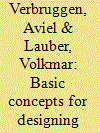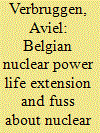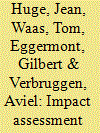|
|
|
Sort Order |
|
|
|
Items / Page
|
|
|
|
|
|
|
| Srl | Item |
| 1 |
ID:
113475


|
|
|
|
|
| Publication |
2012.
|
| Summary/Abstract |
The performance of feed-in tariffs and tradable certificates is assessed on criteria of efficacy, efficiency, equity and institutional feasibility. In the early stage of transition to an energy system based entirely on renewable energy supplies, renewable electricity can only thrive if support takes into account the specific technical, economic and political problems which result from embedding this electricity in conventional power systems whose technology, organizational structure, environmental responsibility and general mission differ profoundly from the emerging, renewable-based system. Support schemes need to capture the diversity of power supplies, the variable nature of some renewable supplies, and their different attributes for the purposes of public policy. They must take into account the variety of generators - including small, decentralized generation - emerging in a renewable-based system, and the new relationships between generators and customers. Renewable energy policies need a clear point of reference: because the incumbent power systems are not sustainable they must adapt to the requirements of the renewable ones, not the other way round. Incumbent systems carry the responsibility of paying the transition, something that corresponds best with the polluter pays principle.
|
|
|
|
|
|
|
|
|
|
|
|
|
|
|
|
| 2 |
ID:
092854


|
|
|
|
|
| Publication |
2009.
|
| Summary/Abstract |
Renewable electricity supply is a crucial factor in the realization of a low-carbon energy economy. The understanding is growing that a full turn-over of the electricity sectors by 2050 is an elementary condition for avoiding global average temperature increase beyond 2 °C. This article adopts such full transition as Europe's target when designing renewable energy policy. An immediate corollary is that phasing-in unprecedented energy efficiency and renewable generation must be paralleled by phasing-out non-sustainable fossil fuel and nuclear power technologies. The double phasing programme assigns novel meaning to nearby target settings for renewable power as share of total power consumption. It requires organizing in the medium term EU-wide markets for green power, a highly demanding task in the present context of poorly functional markets in brown power. The EU Commission's 2007/2008 proposals of expanding tradable certificates markets were not based on solid analysis of past experiences and future necessities. The keystone of sound policies on renewable electricity development is a detailed scientific differentiation and qualification of renewable electricity sources and technologies, for measuring the huge diversity in the field. We provide but structuring concepts about such qualification, because implementation requires extensive research resources.
Support for renewable electricity development is organized via feed-in prices or premiums, and via quota obligations connected to tradable green certificates. Green certificates are dependent on physical generated renewable power, but separable and no joint products. Contrary to conventional wisdom we argue their separation in cost analysis but firm linking during trade. A few graphs illustrate the importance of assigning qualities to different renewable power sources/technologies. Feed-in systems based on an acceptable qualification perform generally better than certificate markets imposing uniform approaches on a very diverse reality. For a similar reason, uniform and undifferentiated taxation of non-sustainable energy sources cannot replace renewable energy support schemes capable of differentiation.
|
|
|
|
|
|
|
|
|
|
|
|
|
|
|
|
| 3 |
ID:
124144


|
|
|
|
|
| Publication |
2013.
|
| Summary/Abstract |
Nuclear decision-making is embedded in slowly evolving political, economic and financial institutions. Belgium houses extended nuclear activities, mostly under French control, for example: SUEZ-GDF and EDF own all Belgian nuclear power plants. But a 2003 law mandates the closure of Belgium's nuclear power plants at a service age of 40 years; only force majeure could lift the strict obligation. Opposition to the law argued with climate change danger, financial losses, and loss-of-load risks. The financial issue got interwoven with a fuzzy debate on the definition, height and appropriation of “nuclear rents”. As plausible hypothesis is adopted: the prospected transfer of hundreds millions of euro from power companies to the public interest will create public support for life extension. But the nuclear rents discussion had faded in July 2012 when the Belgian government admitted a 10-year life extension for TIHANGE I (962 MW) and imposed the closure of the 2×433 MW DOEL I and II. Loss-of-load risk was the government's only public argument. The opacity of the decision process and its “fifty-fifty” outcome do not allow proper testing of the hypothesis. The case illustrates that politicians cannot bind their followers except through the deployment of alternative power sources.
|
|
|
|
|
|
|
|
|
|
|
|
|
|
|
|
| 4 |
ID:
109658


|
|
|
|
|
| Publication |
2011.
|
| Summary/Abstract |
As energy issues are at the top of the policy agenda worldwide, policy-makers increasingly need better decision-supporting processes to assist them in fostering a sustainable energy future. This paper reflects on the interpretation of sustainable development, and links these reflections with the theory and practice of impact assessment applied on energy issues. An analysis of existing impact assessment approaches with regard to their contribution to sustainable development leads to a set of principles for 'sustainability assessment'. Through a study of a participatory impact assessment supporting the development of a radioactive waste management plan in Belgium, the interpretational limits of sustainable development in a nuclear energy context are discussed. This paper sheds light on the complex context in which impact assessment exercises must contribute to sustainable energy development, with a focus on the nuclear energy-(un)sustainability nexus.
|
|
|
|
|
|
|
|
|
|
|
|
|
|
|
|
| 5 |
ID:
094242


|
|
|
|
|
| Publication |
2010.
|
| Summary/Abstract |
Renewable energy can become the major energy supply option in low-carbon energy economies. Disruptive transformations in all energy systems are necessary for tapping widely available renewable energy resources. Organizing the energy transition from non-sustainable to renewable energy is often described as the major challenge of the first half of the 21st century. Technological innovation, the economy (costs and prices) and policies have to be aligned to achieve full renewable energy potentials, and barriers impeding that growth need to be removed. These issues are also covered by IPCC's special report on renewable energy and climate change to be completed in 2010. This article focuses on the interrelations among the drivers. It clarifies definitions of costs and prices, and of barriers. After reviewing how the third and fourth assessment reports of IPCC cover mitigation potentials and commenting on definitions of renewable energy potentials in the literature, we propose a consistent set of potentials of renewable energy supplies.
|
|
|
|
|
|
|
|
|
|
|
|
|
|
|
|
| 6 |
ID:
098573


|
|
|
|
|
| Publication |
2010.
|
| Summary/Abstract |
Definitions of fossil fuel reserves and resources and assessed stock data are reviewed and clarified. Semantics explain a large stake of conflict between advocate and critical voices on peak oil. From a holistic sources-sinks perspective, limited carrying capacity of atmospheric sinks, not absolute scarcity in oil resources, will impose tight constraints on oil use. Eventually observed peaks in oil production in nearby years will result from politically imposed limits on carbon emissions, and not be caused by physical lack of oil resources. Peak-oil belief induces passive climate policy attitudes when suggesting carbon dioxide emissions will peak naturally linked to dwindling oil supplies. Active policies for reducing emissions and use of fossil fuels will also encompass higher energy end-use prices. Revenues obtained from higher levies on oil use can support financing energy efficiency and renewable energy options. But when oil producers charge the higher prices they can pump new oil for many decades, postponing peak oil to occur while extending carbon lock-in.
|
|
|
|
|
|
|
|
|
|
|
|
|
|
|
|
|
|
|
|
|